How Bulgaria's blitzkrieg failed in the Balkans
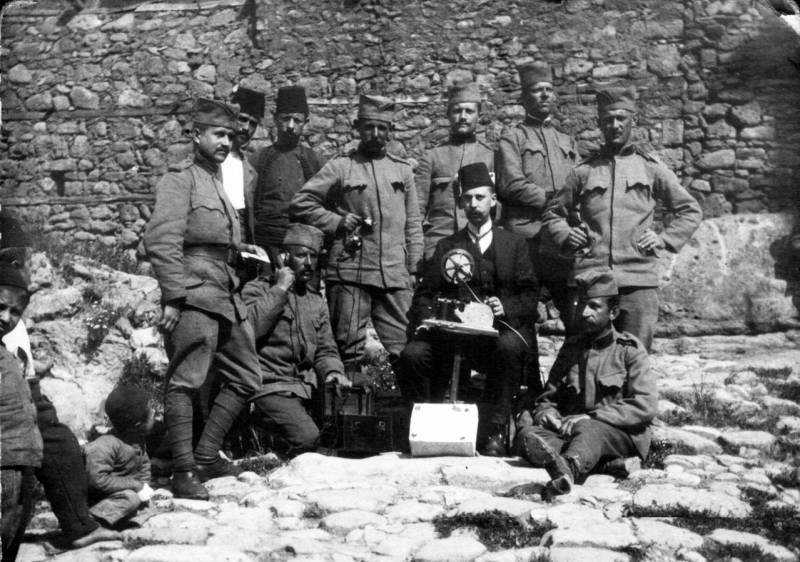
Serbian soldiers in Kratovo
The causes of the war
The First Balkan War almost eliminated Turkey's presence in the Balkans, but did not resolve other Balkan issues. The German bloc, fearing the union of the Slavic Balkan states under the patronage of Russia, tried to win over Bulgaria to its side. Berlin and Vienna took advantage of the great-power aspirations of the elite and the intelligentsia of Bulgaria, Serbia and Greece. The Germans persuaded Belgrade to go to war with Bulgaria and even Greece in order to take Thessaloniki and go to the Aegean Sea. Sophia, the Germans offered to annex Macedonia.
This was facilitated by the fact that Greece, Serbia and Bulgaria were arguing over the ownership of Macedonia. So, not having access to the Adriatic Sea (How Hot Balkan Boys Started a War Over Turkish Inheritance), Serbia decided to compensate itself at the expense of Macedonia. Bulgaria, on the other hand, demanded borders in accordance with the Serbo-Bulgarian treaty, according to which most of the region was ceded to Bulgaria. Belgrade declared this agreement obsolete. In February 1913, the Serbs proposed to Sofia that they revise the territorial terms of the Serbian-Bulgarian agreement.
Serious disputes also arose between Bulgaria and Greece. Athens could not get Northern Epirus, which remained part of Albania. Therefore, the Greeks also wanted to reward themselves at the expense of South Macedonia and Western Thrace, since they had their own historical grounds. Naturally, this undermined the interests of Bulgaria. Already during the First Balkan War, the Greeks and Bulgarians could not divide Thessaloniki. Already in the autumn of 1912, armed skirmishes began between the allies. Although Serbia and Greece, together with Bulgaria, continued the war with Turkey, they began negotiations on limiting Sofia's appetites. Belgrade and Athens had many common interests: they wanted a joint division of Albania and Macedonia, joint trade and economic interests.
The Russian government tried to keep the Balkan Union, which could play an important role in the fight against the Triple Alliance, but in vain. Local ambitions and quarrels came out on top. A day after the conclusion of the London Peace with Turkey (May 30, 1913), on June 1, 1913, the Greek-Serbian Union was formalized. Serbia was supported by Montenegro. He was joined by Romania, which wanted to steal Dobruja from Bulgaria on the sly. During the First Balkan War, Bucharest demanded Southern Dobruja from Sophia as compensation for neutrality. Then the intervention of Russia saved Bulgaria from losing this area. At the conference of ambassadors in St. Petersburg, it was decided to transfer only the city of Silistria to Romania. It is clear that this was not enough for the Romanians. Now Bucharest willingly responded to the proposal of Athens and Belgrade to jointly put pressure on Bulgaria.
Russian diplomacy urged Greece and Serbia to moderate their appetites, and Bulgaria to show compliance. Vienna pushed Bulgaria to war. She promised to give guarantees of territorial integrity, give a loan, and even organize gangs in Albania to disturb the Serbs from the rear. The Bulgarian authorities first put pressure on Russia to show a strong anti-Serb stance. Petersburg did not agree to this. Russia understood that Serbia was the only reliable ally in the Balkans. Petersburg offered arbitration under the Serbian-Bulgarian treaty of 1912.
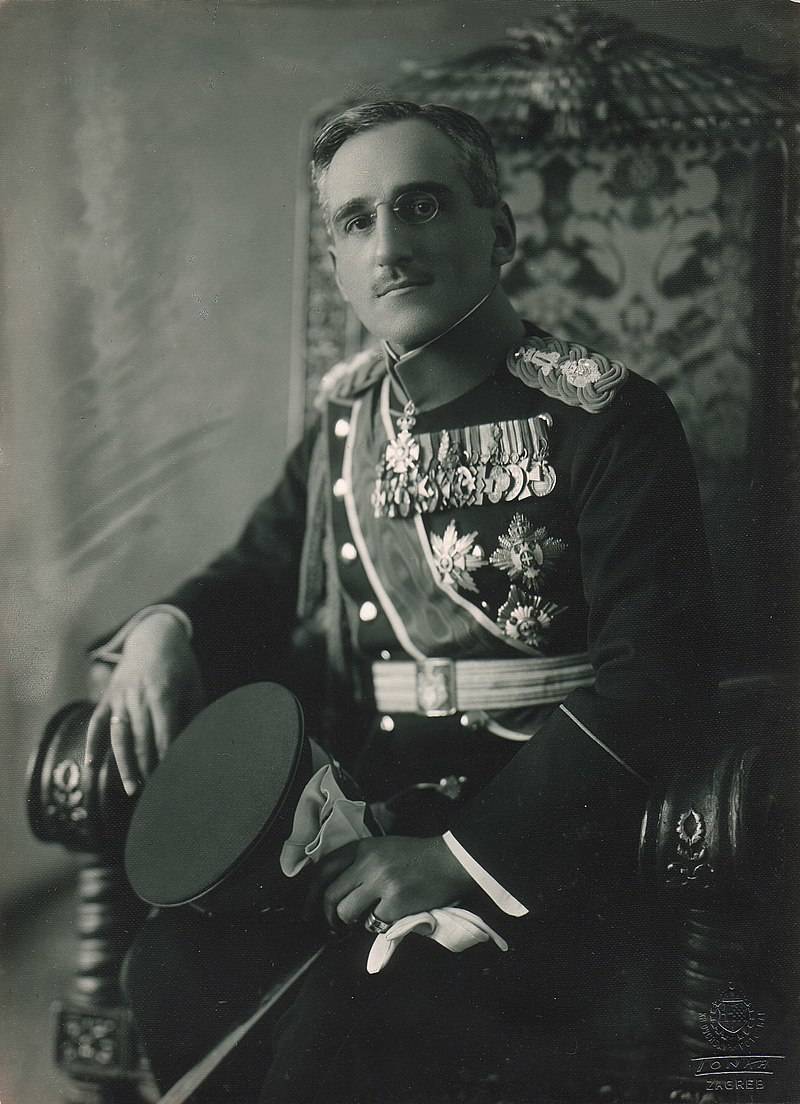
Alexander Karageorgievich - during the years of the Balkan wars he was the heir to the Serbian throne. Personally led the 1st Serbian Army
Bulgaria goes to war
Serbia and Bulgaria begin to transfer troops to the border. Bulgaria had 5 armies (up to 500 thousand), Serbia with the Montenegrin detachment had about 330 thousand (three armies, two detachments and a reserve), Greece fielded 150 thousand soldiers. The main front passed along the Serbian-Bulgarian border. At the end of June 1913, both sides were gathering troops to the border. Negotiations were to begin in St. Petersburg on June 28, so Serbia waited.
In Bulgaria, the military party led by King Ferdinand and the commander of the 4th and 5th armies, General Savov, took over, they decided not to wait for the outcome of the negotiations in Russia. On June 29, 1913, at 3 o'clock in the morning, Bulgarian troops, without declaring war, went on the offensive on the Macedonian section of the border. The 4th Bulgarian army was advancing in Macedonia, the 2nd army was advancing on Thessaloniki. The Bulgarians easily shot down the advanced units of the Serbs and Greeks. But the 1st Serbian army, led by the heir to the throne, Alexander Karageorgievich, immediately counterattacked. On June 30, Greece, Serbia and Montenegro declared war on Bulgaria. The Greek army was personally led by King Constantine. Meanwhile, the 1st and 5th Bulgarian armies went on the offensive against the city of Pirot. But the Serbs fought off this blow.
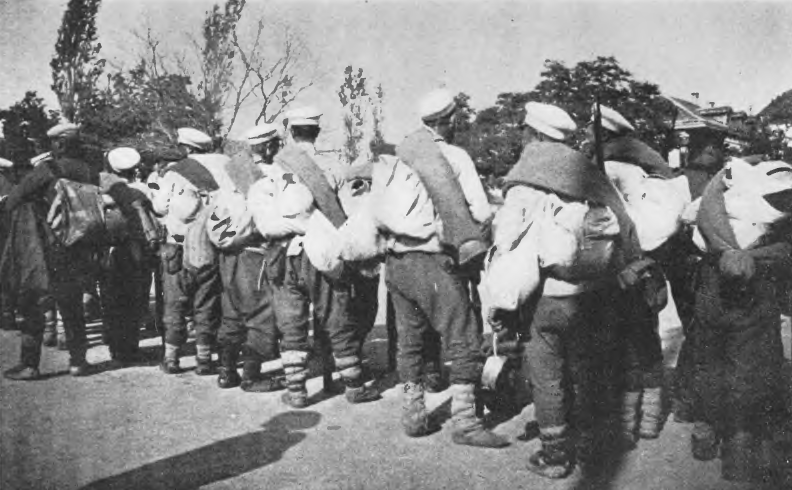
Bulgarian soldiers
Already on July 2, 1913, the Serbo-Greek troops launched a counteroffensive. The Bulgarian leadership clearly overestimated its strength, underestimated the enemy and poorly prepared for the war. The calculation, obviously, was made on the suddenness of the strike, that the enemy would not be ready and would quickly ask for peace. Everything turned out differently. Whole units and formations of the Bulgarian army were demoralized by the strong resistance and attacks of the enemy and surrendered. On the outskirts of Veles, the Serbs managed to capture the Bulgarian 7th division in full force. At Zleta, the Serbs managed to stop the advance of the enemy forces, and at night a significant part of the Bulgarian troops were surrounded and destroyed by powerful artillery fire. A significant part of the 4th Bulgarian army was blocked on the Ovcha field. On the Greek front near Kilkis, by July 4, the Greeks defeated the Bulgarian troops and began their pursuit.
On July 6, the Bulgarian troops tried to counterattack at Doiran, but their offensive bogged down. The Greeks continued their offensive, immediately knocked down the Bulgarians from the Belashitsky Pass, and on July 7 occupied Strumitsa. On July 10, the Bulgarian army withdrew to the eastern bank of the Struma River. On July 11, the Greeks established contact with the 3rd Serbian army. The Greek army developed an offensive to the north and fought for the Kresna Gorge from July 8 to 18, creating a direct threat to the Bulgarian capital.
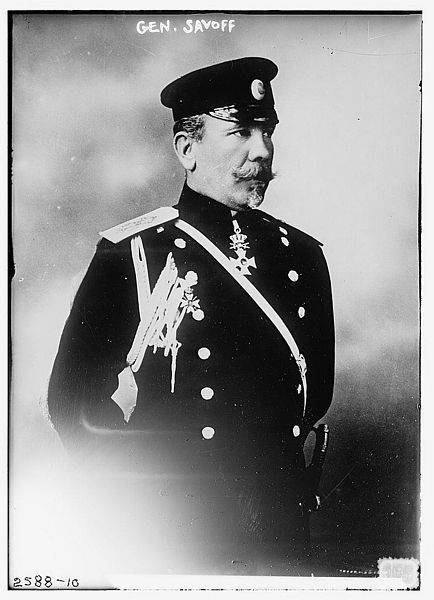
Mikhail Popov Savov (1857–1928) - Bulgarian general, Minister of War of Bulgaria
Complete disaster
It also turned out the complete failure of Sofia's assessment of the military-political situation in the Balkans. The Bulgarian leadership hoped that Austria and Germany would keep Romania from entering the war. Therefore, there were no troops at all on the Romanian border, except for border guards. This calculation turned out to be completely wrong. On July 3, Bucharest, seeing that the offensive of the Bulgarian army bogged down, began mobilization. Further, seeing that the Bulgarian army was being defeated, the Serbs and Greeks were advancing, and the border was bare, on July 10 the Romanian army calmly crossed the border and went to Varna and Sofia. At the same time, Romania put up a 450-strong army, and there were no Bulgarian troops on the Romanian border. The Romanians, as if on a walk, went to Sofia. Soon the Romanian equestrian patrols were 15 km from the Bulgarian capital. It was a disaster.
The Austrian government was ready to intervene in the Second Balkan War, following the example of the First War. At first, Vienna relied on the blitzkrieg of the Bulgarian army and was going to contain Russia so that it would not help Serbia. It soon became clear that the Bulgarian map was broken. Now Vienna wanted to attack Serbia in order to avoid the complete defeat of Bulgaria. At the same time, Austria hoped for the support of Germany. As in the First Balkan War (Balkan rehearsal for European war), they planned to contain Russia by military-diplomatic pressure. Believing that the Russians will give way again.
However, this time Germany refused to support Austria. Berlin feared British intervention. Also in 1913, Germany began new emergency measures to strengthen the army, they had to be completed in peacetime. Berlin also took into account the fact that the Balkan Union is on the side of the Entente: Bulgaria has already been defeated, Serbia is supported by Greece and Romania. Therefore, Germany did not want war at that moment. On July 5, the German Kaiser Wilhelm II warned Vienna against intervening in the war. Italy also strongly supported this position. The Habsburgs had to give in.
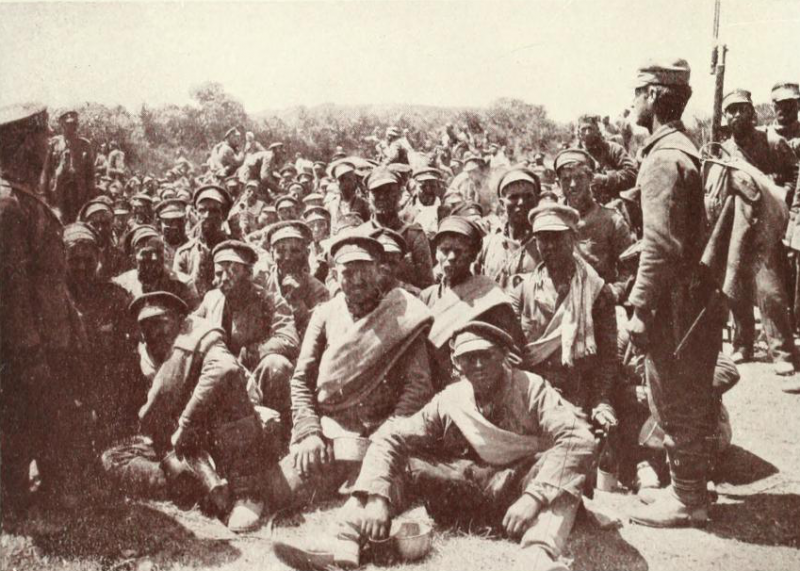
Bulgarian prisoners of war
Another big miscalculation of Sofia was the position of the Ottoman Empire. Türkiye decided to take advantage of the catastrophic situation in Bulgaria. The initiator of the opening of a new front was Enver Pasha, the leader of the Young Turks. He appointed Minister of War Izzet Pasha as commander of the operation. Türkiye came out with a 250-strong army. In diplomatic notes, the Porte reported that the reunification of the lands of Maritsa and Edirne with the Ottoman Empire was necessary to protect Constantinople and the straits, it was also argued that the Turkish population behind the Medea-Enos line was subjected to "systematic exterminationand needs to be protected. On July 12, Turkish forces crossed the Maritsa River and captured Eastern Thrace without much trouble. Bulgaria had few regular troops in this direction to fend off this invasion. On July 23, the Turks captured Edirne-Adrianople. On July 24, Turkish troops crossed the old Bulgarian border of 1912. They burned a number of villages, driving the local population north. The Bulgarian command began to transfer troops to the Thracian direction, and on August 2 the Turkish offensive was stopped.
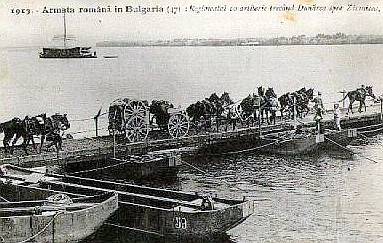
Romanian troops during the invasion of Bulgaria cross the Danube at Zimnitsa
Bucharest peace
It was a disaster. Complete military defeat on several fronts and directions. Threat to the capital. Austria did nothing. On July 29, the Bulgarian government, realizing the hopelessness of the situation, signed a truce. On July 30, a peace conference opened in Bucharest.
The most heated dispute was between Greece and Bulgaria over the Macedonian port of Kavalla. Russia and Austria, in order to maintain influence on Bulgaria, supported the Bulgarian claims to this city. Germany was more cautious, she wanted to get Turkey and Romania as allies, she also tried to strengthen her position in Greece. France took the side of Greece, French big business had its own views on Greece. Italy, in defiance of the Greeks, supported Bulgaria. The matter ended with the victory of Greece, on the side of which Britain also spoke.
On August 10, peace was signed in Bucharest. Serbia received most of both the "disputed" and the Bulgarian part of Macedonia. Greece was given South Macedonia with Thessaloniki, part of Western Thrace with Kavalla. Romania gained Southern Dobruja. On September 29 of the same year, the Treaty of Constantinople was signed, according to which Turkey returned part of Eastern Thrace with Lozengrad, Lule-Burgas and Andrianopol.
In general, this war was also not final. The powers of the Balkan Union fought over the Turkish inheritance. Turkey returned to Europe again and hoped with the help of Germany for revenge, to move further. Serbia received most of Macedonia, but quarreled with Bulgaria and did not have access to the Adriatic Sea. Serbia and Greece wanted to divide Albania, which had become a foothold for Austria and Italy. Bulgaria lost most of the previously conquered lands, except for central Thrace, and dreamed of revenge in order to return the lands in Macedonia and Thrace, South Dobruja.
The collapse of the Balkan Union was beneficial to Austria and Germany, who could now win over the offended Bulgaria to their side. On the other hand, there was a transition of Romania to the side of the Entente. Russian diplomacy tried to reconcile Serbia and Romania with Bulgaria, but without much success. Germany and Austria promoted the idea of creating a union between Bulgaria, Turkey and Romania.
Thus, the Balkan "powder magazine" was again filled with explosive materials. And soon the Balkan question will cause a pan-European war.
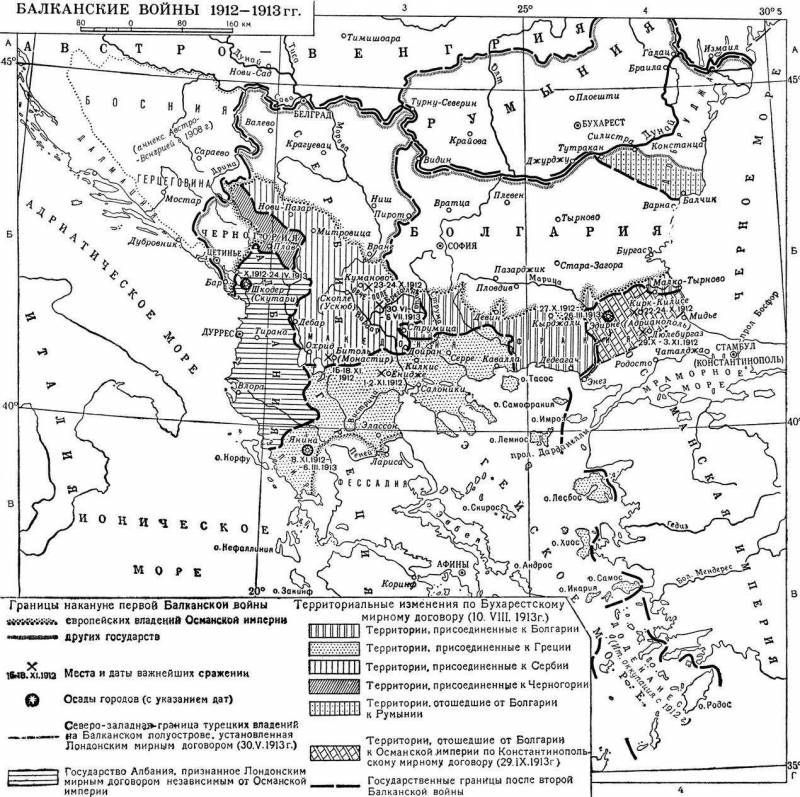
Information